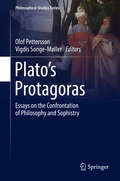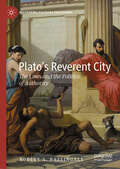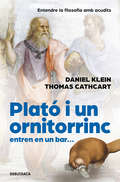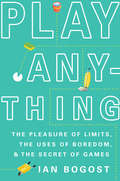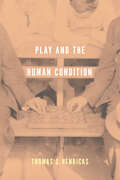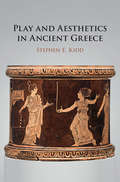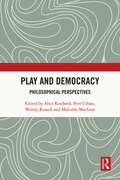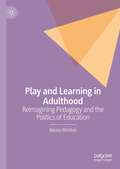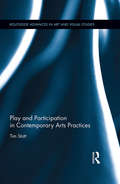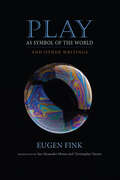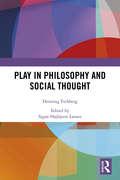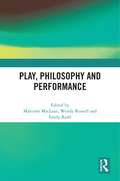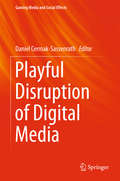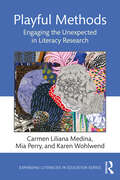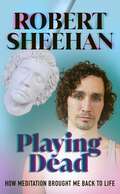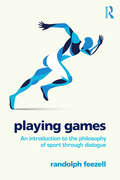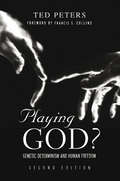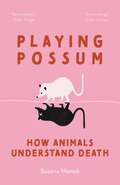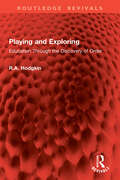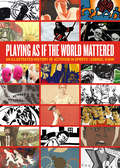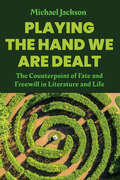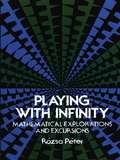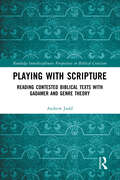- Table View
- List View
Plato’s Protagoras
by Olof Pettersson Vigdis Songe-MøllerThis book presents a thorough study and an up to date anthology of Plato's Protagoras. International authors' papers contribute to the task of understanding how Plato introduced and negotiated a new type of intellectual practice - called philosophy - and the strategies that this involved. They explore Plato's dialogue, looking at questions of how philosophy and sophistry relate, both on a methodological and on a thematic level. While many of the contributing authors argue for a sharp distinction between sophistry and philosophy, this is contested by others. Readers may consider the distinctions between philosophy and traditional forms of poetry and sophistry through these papers. Questions for readers' attention include: To what extent is Socrates' preferred mode of discourse, and his short questions and answers, superior to Protagoras' method of sophistic teaching? And why does Plato make Socrates and Protagoras reverse positions as it comes to virtue and its teachability? This book will appeal to graduates and researchers with an interest in the origins of philosophy, classical philosophy and historical philosophy.
Plato’s Reverent City: The Laws and the Politics of Authority (Recovering Political Philosophy)
by Robert A. BallingallThis book offers an original interpretation of Plato’s Laws and a new account of its enduring importance. Ballingall argues that the republican regime conceived in the Laws is built on "reverence," an archaic virtue governing emotions of self-assessment—particularly awe and shame. Ballingall demonstrates how learning to feel these emotions in the right way, at the right time, and for the right things is the necessary basis for the rule of law conceived in the dialogue. The Laws remains surprisingly neglected in the scholarly literature, although this is changing. The cynical populisms haunting liberal democracies are focusing new attention on the “characterological” basis of constitutional government and Plato’s Laws remains an indispensable resource on this question, especially when we attend to the theme of reverence at its core.
Plató i un ornitorinc entren en un bar: Entendre la filosofia amb acudits
by Thomas Cathcart Daniel KleinPot haver-hi un llibre més original? Una aproximació a la filosofia a través d'acudits. Morty arriba a casa seva i es troba la dona i el seu millor amic Lou, despullats al llit. Quan Morty està a punt d'obrir la boca, Lou surt d'un salt del llit i li diu: «Abans que diguis res, amic meu, a qui creuràs, a mi o als teus ulls?» Lou planteja la pregunta sobre quina mena de dades són segures i per què. És fantàstic, diuen els autors, hi ha una colla d'acudits que ocupen el mateix terreny d'idees que les disciplines filosòfiques. Cathcart i Klein ens fan veure què significa la lògica, l'existencialisme, la relativitat, l'ètica, etc., a través d'aquest llibre ple de vida i d'historietes divertides. També les probabilitats i l'estadística. «Si has de pujar en un avió, i vols sentir-te segur, porta una bomba. Perquè les probabilitats que a l'avió hi hagi algú que en porti una altra són ínfimes».
Play Anything: The Pleasure of Limits, the Uses of Boredom, and the Secret of Games
by Ian BogostHow filling life with play-whether soccer or lawn mowing, counting sheep or tossing Angry Birds-forges a new path for creativity and joy in our impatient ageLife is boring: filled with meetings and traffic, errands and emails. Nothing we'd ever call fun. But what if we've gotten fun wrong? In Play Anything, visionary game designer and philosopher Ian Bogost shows how we can overcome our daily anxiety; transforming the boring, ordinary world around us into one of endless, playful possibilities.The key to this playful mindset lies in discovering the secret truth of fun and games. Play Anything, reveals that games appeal to us not because they are fun, but because they set limitations. Soccer wouldn't be soccer if it wasn't composed of two teams of eleven players using only their feet, heads, and torsos to get a ball into a goal; Tetris wouldn't be Tetris without falling pieces in characteristic shapes. Such rules seem needless, arbitrary, and difficult. Yet it is the limitations that make games enjoyable, just like it's the hard things in life that give it meaning.Play is what happens when we accept these limitations, narrow our focus, and, consequently, have fun. Which is also how to live a good life. Manipulating a soccer ball into a goal is no different than treating ordinary circumstances- like grocery shopping, lawn mowing, and making PowerPoints-as sources for meaning and joy. We can "play anything" by filling our days with attention and discipline, devotion and love for the world as it really is, beyond our desires and fears.Ranging from Internet culture to moral philosophy, ancient poetry to modern consumerism, Bogost shows us how today's chaotic world can only be tamed-and enjoyed-when we first impose boundaries on ourselves.
Play Reconsidered: Sociological Perspectives on Human Expression
by Thomas S. HenricksUnderstanding the significance of adult play in the life of modern societies Within the social sciences, few matters are as significant as the study of human play--or as neglected. In Play Reconsidered, rather than viewing play simply as a preoccupation of the young and a vehicle for skill development, Thomas S. Henricks argues that it’s a social and cultural phenomenon of adult life, enveloped by wider structures and processes of society. In that context, he argues that a truly sociological approach to play should begin with a consideration of the largely overlooked writings on play and play-related topics by some of the classic sociological thinkers of the twentieth century. Henricks explores Karl Marx’s analysis of creativity in human labor, examines Emile Durkheim’s observations on the role of ritual and the formation of collective consciousness, extends Max Weber’s ideas about the process of rationalization to the realm of expressive culture and play, surveys Georg Simmel’s distinctive approach to sociology and sociability, and discusses Erving Goffman’s focus on human conduct as process and play as “encounter.” These and other discussions of the contributions of more recent sociologists are framed by an initial consideration of Johan Huizinga’s famous challenge to understand the nature and significance of play. In a closing synthesis, Henricks distinguishes play from other forms of human social expression, particularly ritual, communitas, and work.
Play Today: Building the Young Brain Through Creative Expression
by Ann BarbourWhen young children are engaged in imaginative play, they are not just having fun; they are developing skills and concepts that are foundational to their learning. Teachers can get the most out of this critical development time with thoughtful preparations that allow the children to freely explore their creativity and learn from each other. Using simple props and donated items, the book shows how centers can be transformed into rich and rewarding learning spaces for children. Play Today offers dozens of easy-to-do scenarios that will spark open-ended play explorations.
Play and Aesthetics in Ancient Greece
by Stephen E. KiddWhat is art's relationship to play? Those interested in this question tend to look to modern philosophy for answers, but, as this book shows, the question was already debated in antiquity by luminaries like Plato and Aristotle. Over the course of eight chapters, this book contextualizes those debates, and demonstrates their significance for theoretical problems today. Topics include the ancient child psychology at the root of the ancient Greek word for 'play' (paidia), the numerous toys that have survived from antiquity, and the meaning of play's conceptual opposite, the 'serious' (spoudaios). What emerges is a concept of play markedly different from the one we have inherited from modernity. Play is not a certain set of activities which unleashes a certain feeling of pleasure; it is rather a certain feeling of pleasure that unleashes the activities we think of as 'play'. As such, it offers a new set of theoretical challenges.
Play and Democracy: Philosophical Perspectives
by Wendy Russell Malcolm MacLean Petr Urban Alice KoubováThis book explores the complex and multi-layered relationships between democracy and play, presenting important new theoretical and empirical research. It builds new paradigmatic bridges between philosophical enquiry and fields of application across the arts, political activism, children’s play, education and political science. Play and Democracy addresses four principal themes. Firstly, it explores how the relationship between play and democracy can be conceptualized and how it is mirrored in questions of normativity, ethics and political power. Secondly, it examines different aspects of play in urban spaces, such as activism, aesthetic experience, happenings, political carnivals and performances. Thirdly, it offers examples and analyses of how playful artistic performances can offer democratic resistance to dominant power. And finally, it considers the paradoxes of play in both developing democratic sensibilities and resisting power in education. These themes are explored and interrogated in chapters covering topics such as aesthetic practice, pedagogy, diverse forms of activism, and urban experience, where play and playfulness become arenas in which to create the possibility of democratic practice and change. Adding extra depth to our understanding of the significance of play as a political, cultural and social power, this book is fascinating reading for any serious student or researcher with an interest in play, philosophy, politics, sociology, arts, sport or education.
Play and Learning in Adulthood: Reimagining Pedagogy and the Politics of Education
by Nicola WhittonThis book provides a theoretical and philosophical examination of games, play and playfulness and their relationships to learning and wellbeing in adulthood. It draws on an interdisciplinary literature base (including game-based learning, game studies, education, psychology, and game design) to present a critical manifesto for playful learning in post-compulsory education and lifelong learning. While there is an established body of work in games and learning in adulthood, and a wide literature on the value of play in childhood, the wider potential of play in adulthood and playfulness is under-explored and still emergent. This book offers a comprehensive overview of play in adulthood, exploring the benefits and drawbacks, examining why play in adulthood is different from play in childhood, the role of play in culture, and making an argument for why it is important in our society that we embrace the principles of playfulness.
Play and Participation in Contemporary Arts Practices (Routledge Advances in Art and Visual Studies)
by Tim StottThis book engages debates in current art criticism concerning the turn toward participatory works of art. In particular, it analyzes ludic participation, in which play and games are used organizationally so that participants actively engage with or complete the work of art through their play. Here Stott explores the complex and systematic organization of works of ludic participation, showing how these correlate with social systems of communication, exhibition, and governance. At a time when the advocacy of play and participation has become widespread in our culture, he addresses the shortage of literature on the use of play and games in modern and contemporary arts practice in order to begin a play theory of organization and governance.
Play as Symbol of the World: And Other Writings (Studies in Continental Thought)
by Eugen FinkEugen Fink is considered one of the clearest interpreters of phenomenology and was the preferred conversational partner of Edmund Husserl and Martin Heidegger. In Play as Symbol of the World, Fink offers an original phenomenology of play as he attempts to understand the world through the experience of play. He affirms the philosophical significance of play, why it is more than idle amusement, and reflects on the movement from "child's play" to "cosmic play." Well-known for its nontechnical, literary style, this skillful translation by Ian Alexander Moore and Christopher Turner invites engagement with Fink's philosophy of play and related writings on sports, festivals, and ancient cult practices.
Play in Philosophy and Social Thought
by Henning EichbergTo understand play, we need a bottom-up phenomenology of play. This phenomenology highlights the paradox that it is the players who play the game, but it is also the game which makes us players. Yet what is it that plays us, when we play? Do we play the game, or does the game play us? These questions concern the relation between the playing subject and play as something larger than the individual – play as craft, play as rhythm, play between normality and otherness, even play as religion, as a sense of spiritual play between self and other. This goes deeper than the welfare-political or educational intention to make people play or play more, or to advise individuals to play in a correct and useful way. Exploring topics such as identity, otherness, and disability, as well as activities including skiing, yoga, dance and street sport, this interdisciplinary study continues the work of the late Henning Eichberg and sheds new light on the questions that play at the borders of philosophy, anthropology, and the sociology of sport and leisure. Play in Philosophy and Social Thought is a fascinating resource for students of philosophy of sport, cultural studies, sport sciences and anthropological studies. It is also a thought-provoking read for sport and play philosophers, sociologists, anthropologists, cultural studies scholars, and practitioners working with play.
Play, Philosophy and Performance
by Emily Ryall Wendy Russell Malcolm MacLeanPlay, Philosophy and Performance is a cutting-edge collection of essays exploring the philosophy of play. It showcases the most innovative, interdisciplinary work in the rapidly developing field of Play Studies. How we play, and the relation of play to the human condition, is becoming increasingly recognised as a field of scholarly inquiry as well as a significant element of social practice, public policy and socio-cultural understanding. Drawing on approaches ranging through morality and ethics, language and the nature of reality, aesthetics, digital culture and gaming, and written by an international group of emerging and established scholars, this book examines how our performance at play describes, shapes and influences our performance as human beings. This is essential reading for anybody with an interest in leisure, education, childhood, gaming, the arts, playwork or many branches of philosophical enquiry.
Playful Disruption of Digital Media (Gaming Media and Social Effects Ser.)
by Daniel Cermak-SassenrathThis book starts with the proposition that digital media invite play and indeed need to be played by their everyday users. Play is probably one of the most visible and powerful ways to appropriate the digital world. The diverse, emerging practices of digital media appear to be essentially playful: Users are involved and active, produce form and content, spread, exchange and consume it, take risks, are conscious of their own goals and the possibilities of achieving them, are skilled and know how to acquire more skills. They share a perspective of can-do, a curiosity of what happens next? Play can be observed in social, economic, political, artistic, educational and criminal contexts and endeavours. It is employed as a (counter) strategy, for tacit or open resistance, as a method and productive practice, and something people do for fun.The book aims to define a particular contemporary attitude, a playful approach to media. It identifies some common ground and key principles in this novel terrain. Instead of looking at play and how it branches into different disciplines like business and education, the phenomenon of play in digital media is approached unconstrained by disciplinary boundaries. The contributions in this book provide a glimpse of a playful technological revolution that is a joyful celebration of possibilities that new media afford. This book is not a practical guide on how to hack a system or to pirate music, but provides critical insights into the unintended, artistic, fun, subversive, and sometimes dodgy applications of digital media.Contributions from Chris Crawford, Mathias Fuchs, Rilla Khaled, Sybille Lammes, Eva and Franco Mattes, Florian 'Floyd' Mueller, Michael Nitsche, Julian Oliver, and others cover and address topics such as reflective game design, identity and people's engagement in online media, conflicts and challenging opportunities for play, playing with cartographical interfaces, player-emergent production practices, the re-purposing of data, game creation as an educational approach, the ludification of society, the creation of meaning within and without play, the internalisation and subversion of roles through play, and the boundaries of play.
Playful Methods: Engaging the Unexpected in Literacy Research (Expanding Literacies in Education)
by Mia Perry Carmen Liliana Medina Karen WohlwendThis book introduces three new subjects to the context of literacy research—play, the imaginary, and improvisation—and proposes how to incorporate these important concepts into the field as research methods in order to engage people, materials, spaces, and imaginaries that are inherent in every research encounter. Grounded in cutting-edge theory, chapters are structured around lived narratives of research experiences, demonstrating key practices for unsettling and expanding the ways people interact, behave, and construct knowledge. Through an exploration of difference, play, and the imaginary, authors Medina, Perry, and Wohlwend present an active set of practices that acknowledges and attends to the global, fragmented, politicized contexts in literacy research. This book provides researchers and literacy education scholars with rich and clear theoretical foundations and practical tools to engage in literacy research in ethical, creative, and responsive ways. The authors invite readers to play by exploring the ways in which pedagogical, research, artistic, and other creative contexts can be sites to examine identity, plurality, and difference. Chapters feature innovative elements such as author dialogues that make visible how the authors engage with the ideas they present; guiding questions to prompt reflection and conversation; playful invitations to share possibilities of play in real-world contexts; and stories and practices to ground the conceptual and playful inquiry.
Playful Virtual Violence: An Ethnography of Emotional Practices in Video Games (Elements in Histories of Emotions and the Senses)
by Christoph BareitherViolence in video games has been a controversial object of public discourse for several decades. The question of what kind of emotional experiences players enact when playing with representations of physical violence in games has been largely ignored however. Building upon an extensive ethnographic study of players' emotional practices in video games, including participant observation in online games, qualitative interviews, an analysis of YouTube videos and gaming magazines since the 1980s, this Element provides new insights into the complexity and diversity of player experiences and the pleasures of playful virtual violence. Instead of either defending or condemning the players, it contributes foundational, unprejudiced knowledge for a societal and academic debate on a critical aspect of video gaming. This title is also available as Open Access on Cambridge Core.
Playing Dead: How Meditation Brought Me Back to Life
by Robert Sheehan'A wit and wisdom that harkens back to an age of enlightenment' – RON PERLMAN, ACTOR'A meditation guide from a man with a mind most unlikely to be conducive to meditation' – MANCHÁN MAGAN, WRITER AND BROADCASTER'In this beautifully written story, Robert Sheehan shares his journey from chaos to stillness and how meditation can lead us to a place of connection and calm' – DEB DANA, AUTHOR OF ANCHORED From Robert Sheehan, star of Misfits and The Umbrella Academy, and host of hit podcast The Earth Locker, comes a heartfelt journey to inner peace.In Playing Dead, Robert Sheehan shares intimate reflections on his search for purpose, looking back at the adventures – and misadventures – of his life so far, and sharing the profoundly transformative lessons he has learnt along the way.Meditation is at the heart of Robert's route to spiritual awakening. In Playing Dead he reveals the turbulence in his life that led him to seek calm and tranquility within. A beautiful, meandering memoir reflecting a rich tapestry of experience, uncovering how spirituality has become his anchor in the constant moving tide. Combining storytelling with letters, poetry, childhood memories and thoughtful musings on fame.Through this compelling description of his quest for inner stillness, Robert shows us how we can welcome a practice of meditation into our own lives, with tools for soothing your nervous system and focusing a fretful mind. In a world where our attention is constantly up for grabs, Playing Dead shows how we can give our souls the deep rest we crave.
Playing Games: An introduction to the philosophy of sport through dialogue
by Randolph FeezellWhat is sport? Why does sport matter? How can we use philosophy to understand what sport means today? This engaging and highly original introduction to the philosophy of sport uses dialogue – a form of philosophical investigation – to address the fundamental questions in sport studies and to explore key contemporary issues such as fair play, gender, drug use, cheating, entertainment and identity. Providing a clear, informative and accessible introduction to the philosophy of sport, every chapter includes current sporting examples as well as review questions and guides to further reading. The dialogue form enables students to engage in debate and raise questions, while encouraging them to think from the perspectives of athlete, coach, spectator and philosopher. The issues raised present real and complex ethical dilemmas that relate to a variety of sports from around the world such as soccer, athletics, baseball, basketball, hockey and tennis. No other book brings this rich subject to life through the use of dialogue, making this an indispensable companion to any course on the philosophy or ethics of sport.
Playing God?: Genetic Determinism and Human Freedon
by Ted PetersSince the original publication of Playing God? in 1996, three developments in genetic technology have moved to the center of the public conversation about the ethics of human bioengineering. Cloning, the completion of the human genome project, and, most recently, the controversy over stem cell research have all sparked lively debates among religious thinkers and the makers of public policy. In this updated edition, Ted Peters illuminates the key issues in these debates and continues to make deft connections between our questions about God and our efforts to manage technological innovations with wisdom.
Playing Possum: How Animals Understand Death
by Susana MonsóHow animals conceive of death and dying—and what it can teach us about our own relationships with mortalityWhen the opossum feels threatened, she becomes paralyzed. Her body temperature plummets, her breathing and heart rates drop to a minimum, and her glands simulate the smell of a putrefying corpse. Playing Possum explores what the opossum and other creatures can teach us about how we and other species understand mortality, and demonstrates that the concept of death, far from being a uniquely human attribute, is widespread in the animal kingdom.With humor and empathy, Susana Monsó tells the stories of ants who attend their own funerals, chimpanzees who clean the teeth of their dead, dogs who snack on their caregivers, crows who avoid the places where they saw a carcass, elephants obsessed with collecting ivory, and whales who carry their dead for weeks. Monsó, one of today&’s leading experts on animal cognition and ethics, shows how there are more ways to conceive of mortality than the human way, and challenges the notion that the only emotional reactions to death worthy of our attention are ones that resemble our own.Blending philosophical insight with new evidence from behavioral science and comparative psychology, Playing Possum dispels the anthropocentric biases that cloud our understanding of the natural world, and reveals that, when it comes to death and dying, we are just another animal.
Playing and Exploring: Education Through the Discovery of Order (Routledge Revivals)
by R.A. HodgkinFirst published in 1985, Playing and Exploring draws on many disciplines in order to formulate a new way of thinking about the nature and power of education. As so often with creative thinkers, Robin Hodgkin’s work is at once subversive and conservative. He is radical in insisting on the overriding need to question and subvert the external examination systems that now cripple education (and to raise standards by other means), conservative in asserting with Polanyi that an individual’s or a group’s enterprise draws on a living tradition. The book’s most important contribution is to our understanding of the educational needs of young adults, of the need for adventure and commitment.The author develops a theoretical model that begins with the infant exploring its play space. He argues that the learner is an active, frontier-exploring agent; so too must be any effective teacher. Robin Hodgkin brings forward important new evidence from neuropsychology to show why doing is so important in teaching and learning. His argument that both visual and linguistic competence must cooperate actively in the learning process raises a fundamental question about the part television plays in our culture. In this as in his earlier books, his work is concerned with the real priorities in education, with demonstrating that first-hand feelings of friendship, of wonder, and of danger should be part of the education of all people, especially adolescents, and that our greatest and certainly most expensive failure is to deny the experience of educational success to so many children.
Playing as if the World Mattered: An Illustrated History of Activism in Sports
by Gabriel KuhnThe world of sports is often associated with commercialism, corruption, and reckless competition. Liberals have objected to sport being used for political propaganda, and leftists have decried its role in distracting the masses from the class struggle. Yet, since the beginning of organized sports, athletes, fans, and officials have tried to administer and play it in ways that strengthen, rather than hinder, progressive social change. From the workers' sports movement in the early 20th century to the civil rights struggle transforming sports in the 1960s to the current global network of grassroots sports clubs, there has been a glowing desire to include sports in the struggle for liberation and social justice. With the help of numerous full-color illustrations—from posters and leaflets to paintings and photographs—Playing as if the World Mattered makes this history tangible and introduces an understanding of sports beyond chauvinistic jingoism, corporate-media chat rooms, and multibillion-dollar business deals.
Playing the Hand We Are Dealt: The Counterpoint of Fate and Freewill in Literature and Life
by Michael JacksonThe relationship between literature and life can be construed as a counterpoint of fate and freewill. Rather than equating fate to the ‘hand we are dealt’ which is reducible to the social or familial environments into which we are born, this book explores the idea of fate through the books that shape our lives and under whose influence we write. Writing in this sense is seen as beyond its utility of making meaning. It is a way of recovering agency in the face of overwhelming experiences. In juxtaposing factuality and fiction, the author makes a case for a radically empirical approach to human experience.
Playing with Infinity: Mathematical Explorations And Excursions (Dover Books on Mathematics)
by Rózsa PéterThis popular account of the many mathematical concepts relating to infinity is one of the best introductions to this subject and to the entire field of mathematics. Dividing her book into three parts -- The Sorcerer's Apprentice, The Creative Role of Form, and The Self-Critique of Pure Reason -- Peter develops her material in twenty-two chapters that sound almost too appealing to be true: playing with fingers, coloring the grey number series, we catch infinity again, the line is filled up, some workshop secrets, the building rocks, and so on.Yet, within this structure, the author discusses many important mathematical concepts with complete accuracy: number systems, arithmetical progression, diagonals of convex polygons, the theory of combinations, the law of prime numbers, equations, negative numbers, vectors, operations with fractions, infinite series, irrational numbers, Pythagoras' Theorem, logarithm tables, analytical geometry, the line at infinity, indefinite and definite integrals, the squaring of the circle, transcendental numbers, the theory of groups, the theory of sets, metamathematics, and much more. Numerous illustrations and examples make all the material readily comprehensible.Without being technical or superficial, the author writes with complete clarity and much originality on the whole range of topics from counting to mathematical logic. Using little algebra and no mathematical formulas, she has written an unusual book that will interest even mathematicians and teachers. Beginning mathematics students and people in the humanities and other fields will find the book particularly outstanding for their purposes.
Playing with Scripture: Reading Contested Biblical Texts with Gadamer and Genre Theory (Routledge Interdisciplinary Perspectives on Biblical Criticism)
by Andrew JuddThis book puts a creative new reading of Hans-Georg Gadamer’s philosophical hermeneutics and literary genre theory to work on the problem of Scripture. Reading texts as Scripture brings two hermeneutical assumptions into tension: that the text will continually say something new and relevant to the present situation, and that the text has stability and authority over readers. Given how contested the Bible’s meaning is, how is it possible to ‘read Scripture’ as authoritative and relevant? Rather than anchor meaning in author, text or reader, Gadamer’s phenomenological model of hermeneutical experience as Spiel (‘play’) offers a dynamic, intersubjective account of how understanding happens, avoiding the dead end of the subjective–objective dichotomy. Modern genre theory addresses some of the criticisms of Gadamer, accounting for the different roles played by readers in different genres using the new term Lesespiel (‘reading game’). This is tested in three case studies of contested texts: the recontextualization of psalms in the book of Acts, the use of Hagar’s story (Genesis 16) in nineteenth-century debates over slavery and the troubling reception history of the rape and murder in Gibeah (Judges 19). In each study, the application of ancient text to contemporary situation is neither arbitrary, nor slavishly bound to tradition, but playful.
